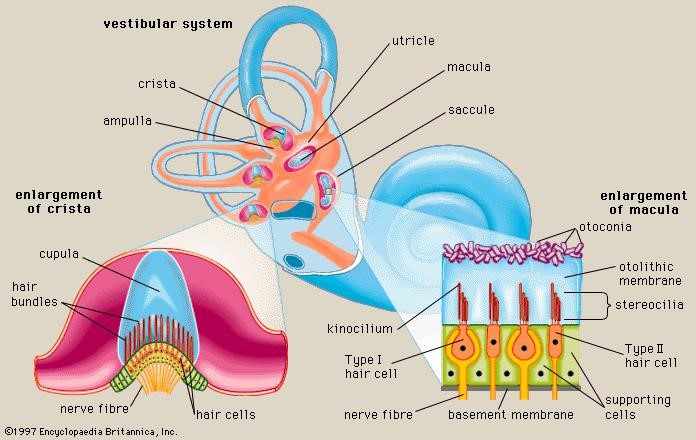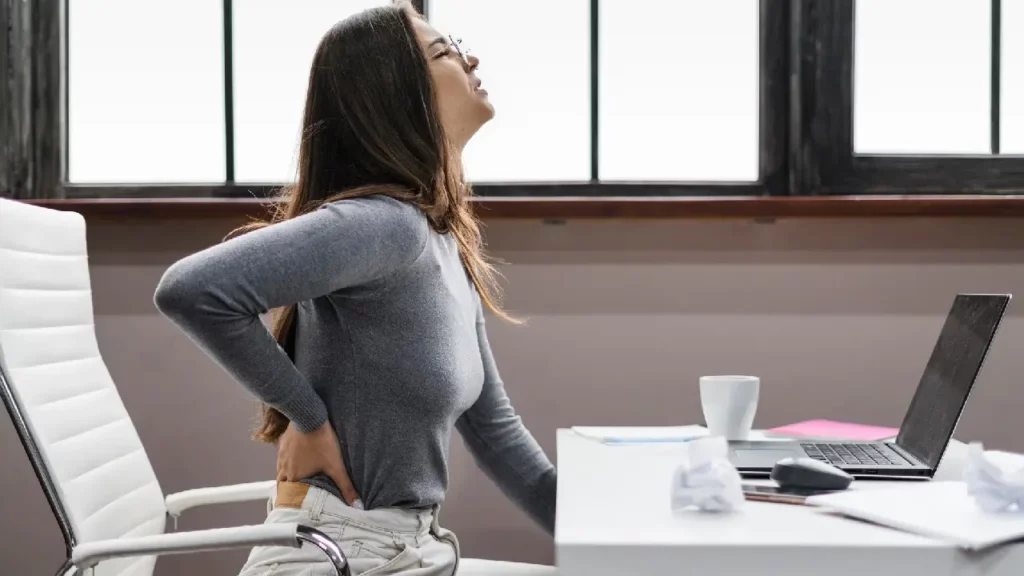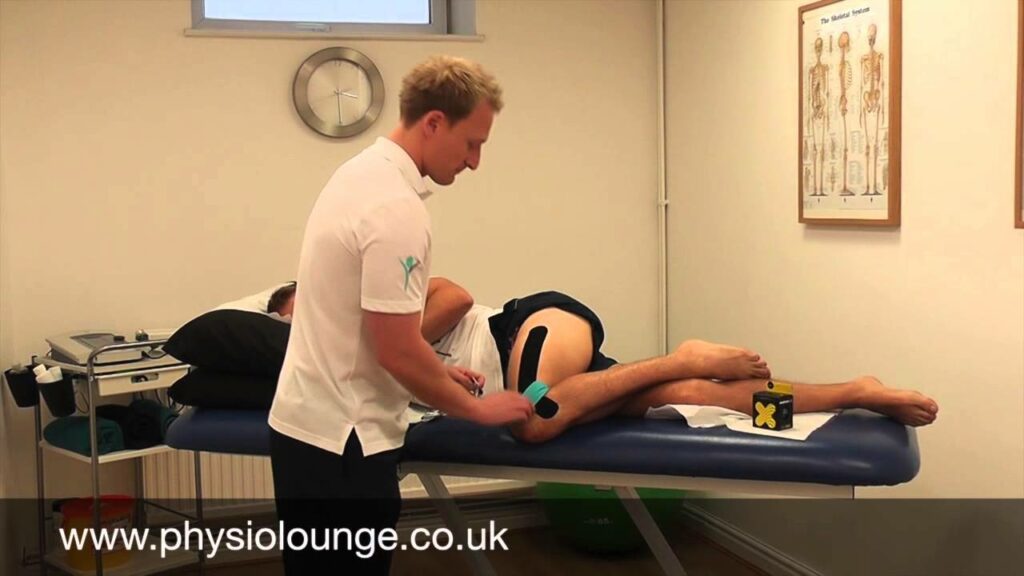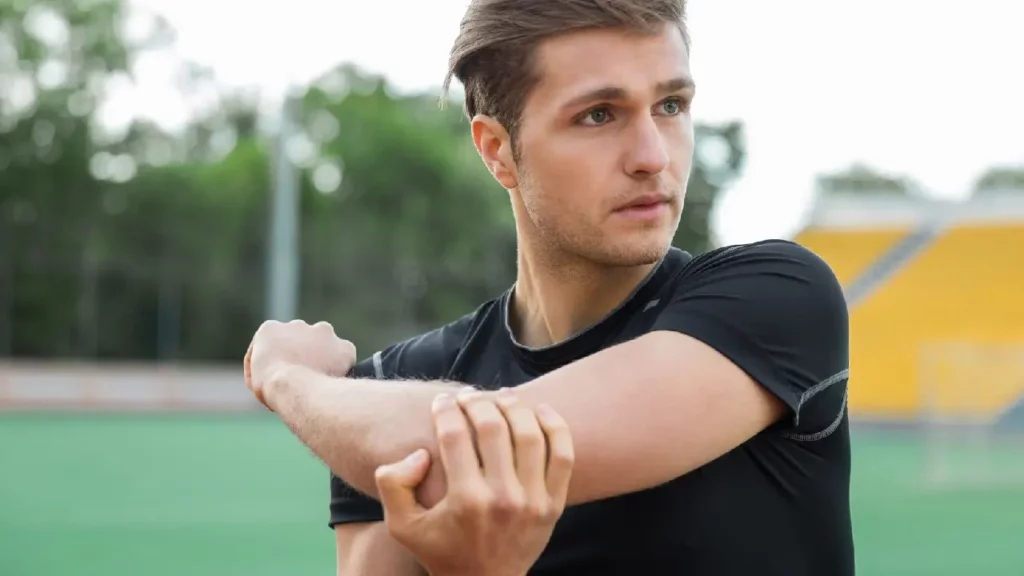Unfortunately there are many tragic tales of people experiencing dizziness and vertigo. They go to their GP, get put on medication (which doesn’t always help) and end up resigning themselves to just living with it. But fear not, there is hope! Dizziness can have many causes, several of which can be totally resolved with physiotherapy treatment. In this post we’re going to walk you through some of those causes, explain the ones physio can help with and teach you about the vestibular system.
Our ability to balance is based on 3 main factors:
- Vision – information from the eyes
- Proprioception – information from your muscles and joints
- Vestibular system – information from your inner ear
All these systems work together to maintain your balance and make adjustments as needed to keep you upright when you twist, turn, spin (whatever funky moves you’re throwing).
What is the vestibular system?

The vestibular system is a sensory system with the job of providing us with information regarding: motion, spatial orientation and head position. It helps us to stabilise our head and body during movement so we can maintain our balance.
You can find the main structures of the vestibular system in the inner ear. The cochlea is the snail shell shaped structure which is the auditory or “hearing” part of the ear. Then you’ll notice three tubes (canals) which are each located in different planes in which the head can move (front and back, side to side and rotating). The canals are filled with fluid and when the head moves it causes the fluid to move. The fluid washes over hair cells called ‘cilia’ which in turn send messages to the brain, bringing it up to speed on which movement is occurring.
The two other main structures are the otolith organs. Think of these are little houses that store crystals. They are sensitive to acceleration and gravity forces.
Utricule – Detects horizontal movements
Saccule – Detects vertical movements
Hair cells in the otolith organs are stimulated by the movement of these crystals called otoconia which physically move them, similar to the way the fluid moves the hair cells in the canals. These organs are also sensitive to acceleration, think about when you take off on a plane.
Provided these three systems are all “singing from the same hymn sheet” so to speak, everything’s hunky dory. But what if there’s a mismatch of information? Have you ever been sat on a static train when the train next to you starts pulling away. For a second you think you’re moving based on what your eyes can see. The info coming from your muscles and joints however tells a different story. They tell you that you’re not moving. Your vestibular system would also be telling your brain that you’re not moving. The reason that you may feel dizzy or different is that the brain is receiving a mismatch of information from the three systems. However, if you were to look down at the floor you return to a state where all three 3 systems are in agreement and everything’s fine again.
BPPV – Benign Paroxysmal Positional Vertigo
If you saw our Instagram blog post we talked about this mouthful being a common cause of dizziness. This is where crystals fall out of their house and end up in one of the inner ear canals, throwing off your sense of balance. There are several canals they can fall into which will be identified by your Physiotherapist during assessment, but the most common by far is the posterior canal. BPPV accounts for up to 50% of dizziness. Symptoms include:
- Sudden onset dizziness
- Severe spinning
- Aggravated turning over in bed
- Aggravated head tilting back (may help to rest with head up on pillows)
- Symptoms settle within 60 seconds if head is kept still
This is most certainly one that be treated with physio and most patients don’t require medication. However early intervention is essential.
Treatment includes:
- Canalith respositioning manoeuvres (including the Epley Manoeuvre, Semont , reverse Epley or BBQ)
- Vestibular rehabilition (VRT)
Vestibular Neuronitis
Another common cause of dizziness that accounts for around 30% of vestibular problems is Neuronitis. This is basically a fancy way of saying you have an inflamed nerve, but in this case a specific nerve called your ‘8th cranial or vestibular nerve’. This can happen if your immune system has been down in the dumps, you pick up a viral infection such as Herpes which can set it off.
- Sudden severe attack lasting a few days
- Dizziness with all head movements
- Severe Spinning
- Potential vomiting
Initially this would be one for the GP and treated with corticosteroids such as prednisolone for the first 10 days. Then vestibular rehabilitaiton (VRT) should commence with a physiotherapist to ‘reset’ the system. This is essential to ensure that the right and left ears are sending the same signals to the brain to avoid a mis-match.
Treatment includes:
- Gaze stability exercises
- Balance re-training
- Functional / task specific exercises
Wrap Up
So in conclusion, while your Physiotherapist probably isn’t the first person that jumps to mind when you’re experiencing dizziness, at The Physio Lounge we treat vestibular issues and help people get back living happy dizziness free lives. Don’t suffer in silence, don’t feel disheartened if your GP hasn’t been able to help. If it’s not a cause of dizziness we can treat, we’ll help you by identifying who you need to be referred to.
For more information you can contact us or if you would like to discuss your symptoms to see if we can help then request a free therapist callback. You can also book a vestibular assessment online using our booking portal below.



